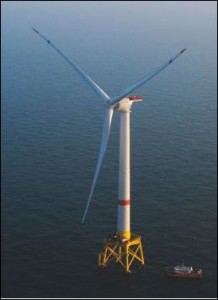Earlier this year Dominion Virginia Power received a bid for building two experimental offshore wind turbines that exceeded internal cost projections by more than half, making the proposed project unlikely to win State Corporation Commission approval. In a July stakeholder meeting, DVP executives laid out their analysis of what went wrong. Now stakeholders will convene in three “problem solving cohorts” to determine how to bring down the cost of the project.
According to Nancy Lowe, with the Virginia Center for Consensus Building, which Dominion has engaged to lead the process, the groups will be broken down as follows:
- “Contract process and logistics – horizontal vs. vertical contracting, how to cut costs and balance risk through implementation and execution strategies, including multiple contracts versus a single contract, etc.
- Technology – focus on balancing the cost issue with the amount of innovative technology to be developed and explore other technology issues.
- Policy Issues – determine the laws or regulations that could be changed to improve the chances of success. Determine the likelihood of being successful in achieving the modification noted, identify and quantify benefits to Virginia ratepayers.”
The stakeholders will not address the issue of cost sharing. Finding other groups to help shoulder the cost of funding the project, which would demonstrate the efficacy of new technologies benefiting the wind power industry broadly, would best be pursued by “the facilitator,” i.e. DVP, wrote Lowe in a communication to stakeholders.
Among the critical technologies to be demonstrated in this proposed pilot test are adaptations to the kind of hurricane-force winds that turbines are likely to encounter in the Atlantic Ocean. Without that technology, investing billions of dollars in an offshore wind farm might be too risky to win regulatory approval.
— JAB



